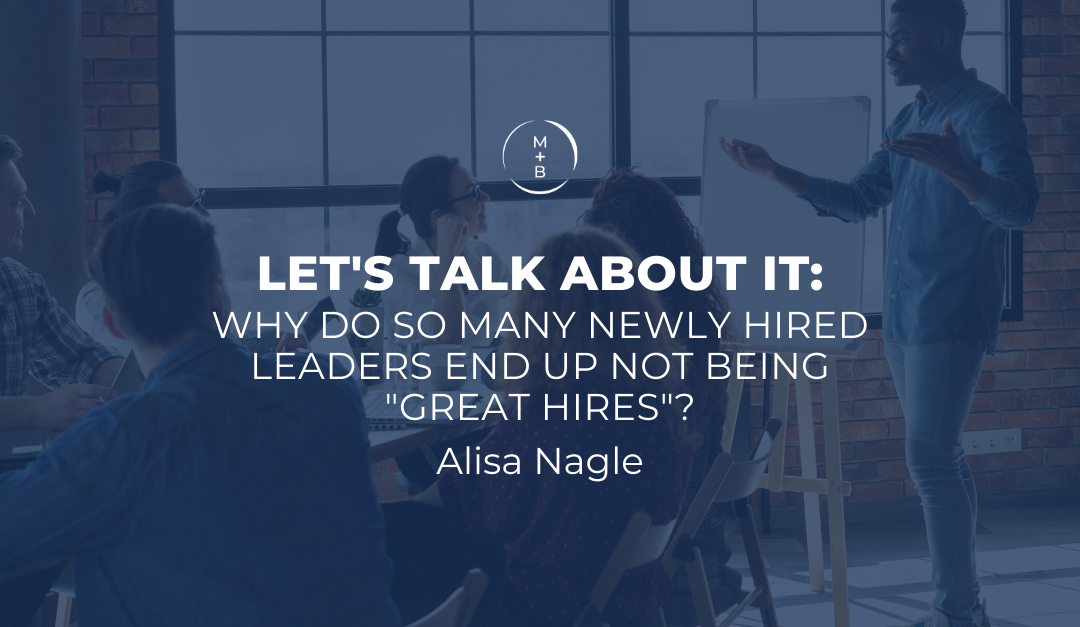Let’s talk about it: why do so many newly hired leaders end up not being “great hires”?
I recently connected with a CEO who really left an impression on me.
He started his career as an engineer. He worked across functions, led a small P+L, then a region, then a global division, and is now the CEO of a global industrial company.
He is experienced and resilient, and he seemed open and trusting.
He told me that over the years he had hired dozens of people. Not enough of them seemed to have been “great hires.” According to a McKinsey study, about 50% of newly hired leaders industry-wide are as successful as expected.
He shared that he had probably not been honest about why they had not been great hires, even with himself. Thus, over the years, he had not given himself or his team the opportunity to explore hiring outcomes as a broader matter. When leaders were less successful than expected or failed to perform at their potential, it was framed and explained as a unique event rather than a pattern.
As we talked, we agreed that there can be instances when something important gets missed during the hiring process, and events can happen outside of our control. However, this rarely happens when the decision makers are aligned on critical success factors and credible experts are vetting candidates to dive into their previous experience and capacity to grow. In other words, these instances rarely occur when there is a robust and credible search process.
This CEO’s story has not ended yet. His thesis is not fully formed either.
He is spending more time reflecting on and paying more attention to his leadership style. He is challenging himself to deeply consider all of the controllable predictors of leadership success at his company, including: the atmosphere he personally creates, the behaviors that are promoted, the culture that is created, all of the unwritten rules and belief systems, and the barriers and enablers to success.
He’s recognized a silver lining in 2020: his job as a leader is to connect with employees at all levels. He is striving to create more space for his team to show up as who they are — complex human beings who have preferences, fears, experiences, and values that affect how they respond and behave, and ultimately how they perform. He is thinking deeply about cause and effect and how much of a role this plays in enabling more of his leadership team to become “great hires.”
He did not tell me this in so many words, but it seems as though he is also thinking about his legacy as a CEO.
On reflection, I have three observations to share with you:
1. Should leaders evolve and adapt their leadership styles to what is needed by others or expect it to be the other way around? Great leaders share their power. They do not strip others of it.
2. As Abby Wambach, a retired American soccer great, two-time Olympic gold medalist, FIFA World Cup champion, best-selling author, and activist for equality and inclusion, said, “Each time things don’t go as expected we have three options: blame, shame, claim.” Are enough leaders claiming appropriate responsibility for the success of others?
3. Lastly, why do we have unwritten rules and unexplained belief systems? Should senior leaders be more thoughtful and proactive about sharing these expectations? These are a few examples of these unwritten rules that you may recognize:
“It’s too early for you to share a new vision with the organization.”
“You need to build more relationships and a shared mindset before you make these big decisions. Peer buy-in is very important in our organization.”
“In our culture, and as a new leader, you need to let people save face. You already got the job, you don’t need to try this hard to come out on top.”
“Don’t turn off your video during Zoom meetings.”
I hope you enjoyed reading this. As always, I would love your reactions, responses, and challenges. Reach out any time.

Alisa Nagle
Managing Director
(414) 339-7454
anagle@mbexec.com
Alisa Alaudini Nagle serves as a Managing Director and drives the firm’s global industrial, automotive, and mobility practice. She is based in the firm’s Detroit, Michigan office where she serves clients globally as a talent and executive solutions partner.
Alisa has spent over 25 years as a human capital leader and transformation business partner. As an experienced Chief Human Resources Officer and Head of Human Resources, she serves her clients as a market and leadership resource.
Alisa has lived and traveled all around the world and has held global human resources leadership roles at Ford Motor Company, Fiat-Chrysler Automobiles N.V., and Johnson Controls Inc.

